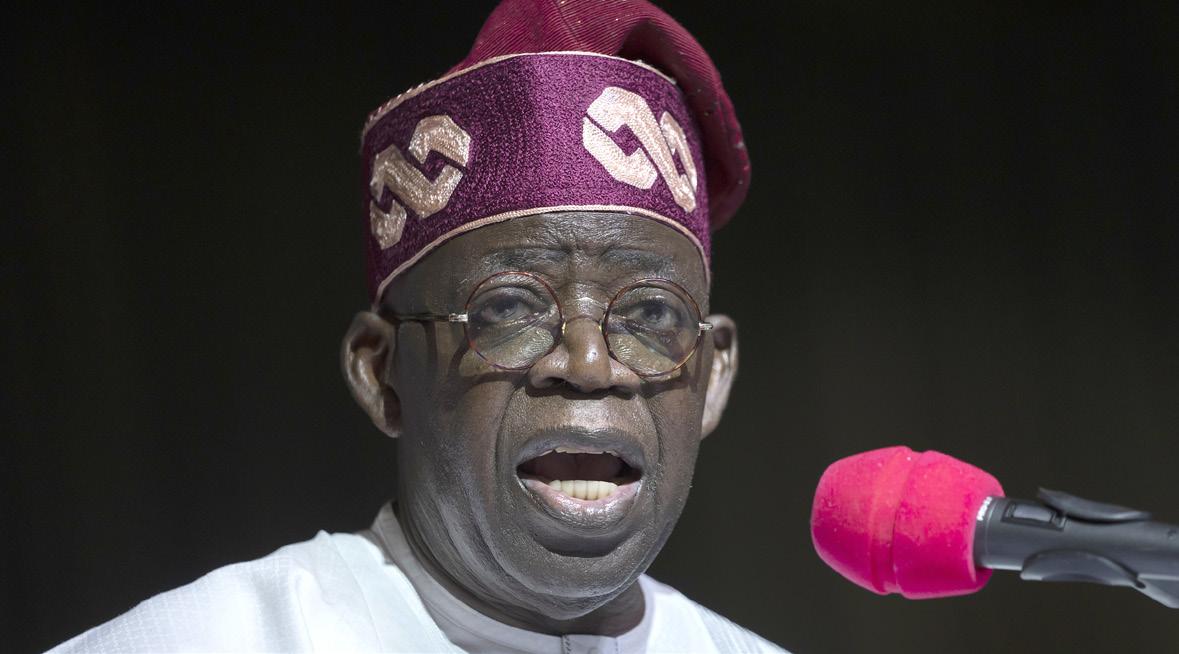
2 minute read
Nigerians contemplate new president, after testy election
BY NAYABA ARINDE Amsterdam News Editor
Nigeria’s Saturday, Feb. 25th presidential election was finally called Tuesday night in the U.S., or Wednesday morning in Nigeria, which is six hours ahead.
Former governor of Lagos and All Progressives Congress candidate Bola Tinubu, 70, was declared the winner, reportedly garnering most of the popular vote, although he lost his own Lagos State.
Out of 18 candidates, there were three main challenges to replace current president Muhammadu Buhari. Tinubu was one of the leading candidates. People’s Democratic Party’s Atiku Abubakar, 76, was on his sixth run for presidency. Labor Party candidate Peter Obi, 61, with massive youthful support, had a surprisingly successful campaign. Has put up an impressive race, and had major support outside the country, too.
Millions of Nigerians at home and in the diaspora had been on tenterhooks awaiting the result and the aftermath.
Charges of misplaced votes, reported irregularities, prohibitive technical issues, polling units and voters being attacked, violence, fraud, threatening behavior, and charges of corruption were levied against the Independent National Electoral Commission (INEC) as state results trickled in and people reacted to disputed results. Some calls, including from former president Olusegun Obasanjo, were made for the election to be canceled.
Until the official election result announcement, Obi’s supporters were celebrating in the streets and online as each winning result came in states such as his own Anambra, Edo, Delta, Cross River, and Imo.
But even as the definitive, immediate Nigerian opposition to the already-disputed result kicks off, INEC Chairman Mahmood Yakubu announced that Tinubu, “having satisfied the requirements of the law, is hereby declared the winner and is returned elected.”
The commission declared the race for Tinubu, who garnered 8.8 million votes. Atiku Abubakar earned 6.9 million votes, and Peter Obi won 6.1 million. The uproar was immediate, however.
Any casual analysis of the political plan in the last few weeks will reveal this very scenario being a topic of discussion, as fears of a compromised election arose.
Meanwhile, even though there have been deaths at polling sites, Nigerian civilians and public officials are calling for calm and a peaceful transition of power so that the nation’s 220 million people can regroup and rebuild.
The election and the anticipation of a fair and accurate result has been the talk of Nigeria, the African continent, and Naija people throughout the diaspora. It has been a tense few days. Results from different states like Lagos, Edo, Kano, and Delta have trickled in, giving hope to election watchers from across the 36 states. So contested have been the results with INEC refusing or unable to upload the votes as they initially came in on Saturday and Sunday that talk of canceling the election and hosting a rerun of the proceedings was trending as late as Tuesday.
Peter Obi’s youthful, self-proclaimed Obidients have been predicting a projected win for weeks. Confident after Saturday, they have been declaring a win despite the other projections suggesting a win for Bola Tinubu. The stage was set for unrest— if not physical, at least vocal and continuous. Already Al Jazeera reports that at a joint presser from opposition parties People’s Democratic Party (PDP), Labour Party (LP), and African Democratic Congress (CDC) are charging that the election result was actually “vote










